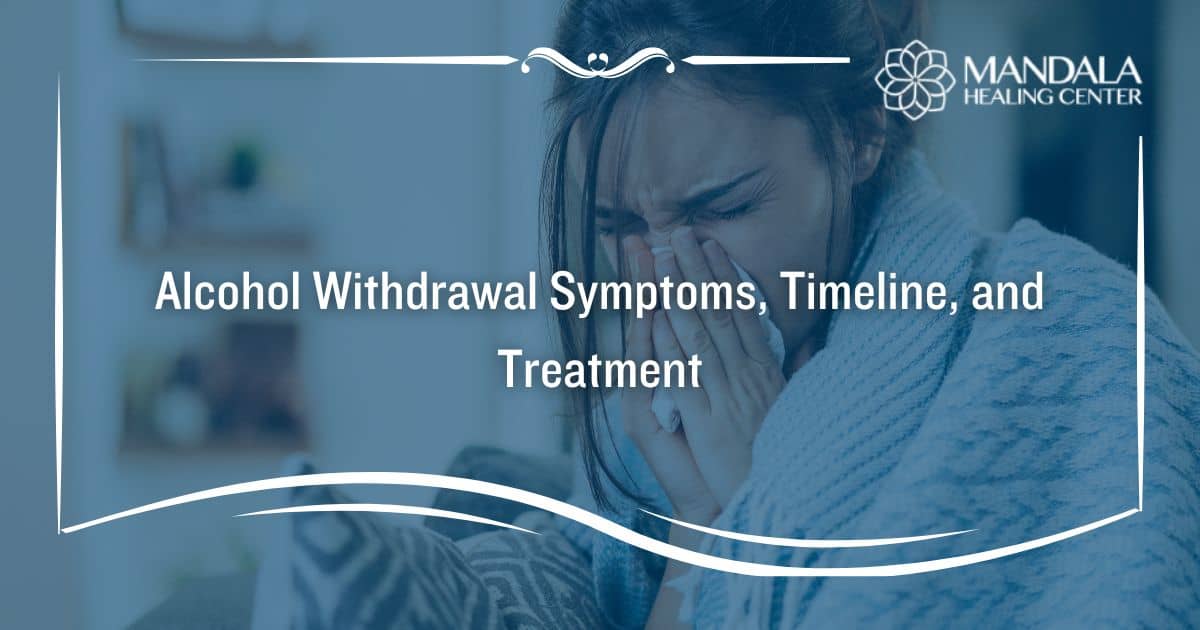Alcoholism is a common problem in the United States, with nearly 30 million people suffering from the condition in 2021.[1]
When you are addicted to alcohol, your brain gets used to working in overdrive to compensate for the depressant effects of it. If you suddenly stop drinking alcohol, your brain will continue to work harder than it needs to, causing you to experience withdrawal symptoms.
The symptoms of alcohol withdrawal can range from mildly uncomfortable to life-threatening depending on the severity of your alcohol use disorder and your overall health. Because there is no way to tell how severe your symptoms will be or how long they will last, you must seek help from an alcohol detox center near you.
What are the Symptoms of Alcohol Withdrawal?
When you frequently consume alcohol, your body will produce excess amounts of stimulating chemicals like dopamine and gamma-aminobutyric acid (GABA) in an attempt to counteract the effects of alcohol abuse.
As you continue to consume excessive amounts of alcohol, your body will become accustomed to the substance. This will cause you to build a tolerance, meaning you will need a larger dose of alcohol to experience the desired effects. Simultaneously, your body will continue to produce excess amounts of neurotransmitters, causing your brain chemistry to be imbalanced.
If you stop drinking alcohol, your brain will continue to over-produce the stimulating chemicals it needed to counteract the effects of alcohol. This is why you experience symptoms of withdrawal.
The symptoms of alcohol withdrawal include:
- Anxiety and irritability
- Nausea and vomiting
- Headaches
- Increased heart rate
- Excessive sweating
- Confusion
- Insomnia or nightmares
- High blood pressure
- Delirium tremens (DTs)
Delirium tremens are the most severe form of alcohol withdrawal. This condition can cause you to deal with symptoms like seizures, hallucinations, delusions, and heart complications. Because delirium tremens has a mortality rate of 37% without treatment, you must always seek professional help.[2]
How Long Does Alcohol Withdrawal Last?
How long alcohol withdrawal lasts can vary depending on how often you drink, how long you’ve been drinking heavily, your liver health, and other factors. While the exact alcohol withdrawal timeline varies from person to person depending on a set of factors, most people experience a similar timeline.
8 Hours
Typically, withdrawal symptoms will arise 8 hours after your last drink. The initial symptoms of alcohol withdrawal tend to be mild, often including symptoms like restlessness, anxiety, nausea, clammy skin, and shakiness.
12 to 24 Hours
Sometime between 12 to 24 hours after your last drink, your withdrawal symptoms will begin to worsen. Because this stage of withdrawal can be incredibly difficult to cope with, you should always be receiving professional care.
Common symptoms during this phase of alcohol withdrawal include:
- Mood swings
- Night sweats
- Nightmares
- Depression
- “Brain fog” or not thinking clearly
- Headache or migraine
- Insomnia or difficulty sleeping
- Vomiting
If you are going to develop alcoholic hallucinations, they usually begin during this timeframe. Alcohol detox programs can provide you with the proper medications to prevent your withdrawal symptoms from reaching this point of severity.
24 to 72 Hours
Between 24 to 72 hours after your last drink, your withdrawal symptoms will begin to peak. This means they will be at their most severe. You might experience symptoms like nausea, vomiting, tremors, agitation, seizures, and hallucinations.
If you are going to develop delirium tremens, this is when the symptoms will start. Thankfully, the staff at an alcohol detox center can catch the signs of this condition before the symptoms set in, preventing you from experiencing life-threatening side effects.
3+ Days
After 3 days, most people’s symptoms will begin to subside. While the physical symptoms of withdrawal might be over, you could continue to experience cravings for alcohol, anxiety, depression, or insomnia for a couple more weeks.
How is Alcohol Withdrawal Treated?
While alcohol withdrawal can quickly become life-threatening, receiving help from a detox program can make the process safe, comfortable, and easier to overcome. When it comes to the alcohol detox process, there are a variety of options available to ease your symptoms and put you on track to long-term sobriety.
Alcohol withdrawal is typically treated with medications that help limit the symptoms of withdrawal. Typically, you will be given long-acting benzodiazepines such as Librium or Valium (diazepam) and your dose will gradually be reduced each day, helping your body adjust to the changes it is going through.[3]
In addition to medications, you will be monitored on a routine basis to ensure that you are in good health. This includes checking your vital signs to ensure that your blood pressure, breathing rate, and more are at a healthy pace. Additionally, you will have 24/7 access to psychological support to ensure that you are in a healthy state of mind.
Once your withdrawal symptoms subside, you will be transferred into an additional treatment program depending on your personal needs. Typically, you will either enter an inpatient or outpatient rehab center that will provide you with the tools and skills you need to maintain long-term recovery and prevent relapse.
Start Alcohol Detox Today
If you or a loved one are addicted to alcohol, it’s time to seek help. At Mandala Healing Center, we can provide you with the perfect mixture of medical treatment and psychological support to help you overcome the withdrawal phase of alcoholism recovery.
To learn more about our alcohol detox and addiction treatment program, please contact Mandala Healing Center today.
References:
- The National Institute of Alcohol Abuse and Alcoholism (NIAAA): Alcohol Use Disorder (AUD) in the United States: Age Groups and Demographic Characteristics, Retrieved June 2023 From https://www.niaaa.nih.gov/alcohols-effects-health/alcohol-topics/alcohol-facts-and-statistics/alcohol-use-disorder-aud-united-states-age-groups-and-demographic-characteristics
- The National Library of Medicine: Delirium Tremens, Retrieved June 2023 From https://www.ncbi.nlm.nih.gov/books/NBK482134/
- The National Library of Medicine: Alcohol Withdrawal Syndrome: Benzodiazepines and Beyond, Retrieved June 2023 From https://www.ncbi.nlm.nih.gov/pmc/articles/PMC4606320/












